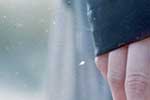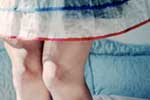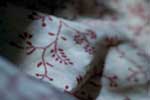Winter 2015: Prose
The Tomorrow Fire
Non-fiction by Kelly Coughlin
Lightning cracked the dark skies open in Butte Falls. Overnight, 700 downstrikes were called in all over Southern Oregon. Walking into the Forest Service compound, still groggy from sleep, I was surprised to see the wilderness packer in green pants and yellow shirt. Excited and alert, he was glad for a change in his usual routine, and eager to chase smoke. Several less-familiar faces had come from Fuels, Administration, and Timber. The smell of coffee filled the air, and electricity from dozens of people eager to fan out into the woods in search of fire filled the office.
Crew 3 was sent to find fire #8 near Hammaker Meadows. As we rode toward the fire, Katy Rennick, the other female first-year fire fighter on our crew, thumbed through one of the children’s books she always brought with her, looking for the perfect riddle. At first, we had scoffed at the books, but we quickly realized they started conversations, and helped us get to know each other better.
Blue eyes sparkling, Katy shifted in her seat and read aloud to the rest of us: “I never was, am always to be. No one ever saw me, nor ever will; and yet I am the confidence of all that live on this terrestrial ball.” We brooded over the answer, instead of focusing on the collective hum of anxiety in the truck. The answer to the riddle, “Tomorrow,” became the name of our fire.
* * *
Bottles full of saw gas clinking against hips, we hiked our new portable backpack pump down to the stream, and started walking lengths of hose up the opposite hill. A few paces up the steep slope, we suddenly heard and felt a loud “crack.” It sounded as though a very large tree had fallen, just beyond where we could see through the dense understory. We could feel the deep vibration as it hit the ground. Eyes adrenaline-charged, Larry, our crew boss, nodded his head up and down at the rest of us. That crazy-eyed nod said, “This is what it’s all about, boys and girls!” We were all looking up the hill, at each other and Larry, our fingers white against the smooth wooden handles of our hand tools.
As we picked our way up through thick underbrush and downed logs, a father and son hiked down toward us, carrying huge dripping chunks of honeycomb. We paused, mouths gaping. They nodded their heads, said nothing and kept walking.
When we arrived at the top of the hill, the story began to tell itself. Less than a quarter mile away from us, smoke and crackling flames curled up from a jagged hole in an enormous standing sugar pine snag. The top third had been struck by lightning and had burned for a while before crashing to the ground. Hundreds of dead and disoriented bees were pouring out of the smoking wood. The top was lying on the ground in large pieces next to the still-standing smokestack of its trunk. Flames were beginning to spread from the fallen top, threading their way into the surrounding duff.
Larry sent me back the way we had just come, with orders to grab a Hefty garbage bag, and the box of disposable surgical gloves we carried in the tool compartment of the truck. I had a feeling he sent me specifically, because he knew that finding my way alone through the trees would provide me a much-needed confidence boost. When I returned about half an hour later, the crew had done very little work. The fire didn’t appear to be going much of anywhere, but there was also an overhead hazard: a large piece of sugar pine still hanging from its trunk about 40 feet up, threatening to fall at any moment where we would be working. Instead of fighting fire right away, we scratched a quick line around it and set to work.
Dirty yellow shirtsleeves rolled up to our elbows, we doffed our soaked fire gloves, and snapped on surgical gloves the way we’d been taught to do in our blood-borne pathogens course. Laughing, our faces bright with astonishment, we took turns reaching deep into the dark hole in the tree. Trying not to touch the sticky edges, we began pulling out oddly shaped chunks of honeycomb that were oozing with honey that glowed golden in the blades of sunlight piercing the smoky air.
The hive appeared to be approximately 9 feet long and 3 feet in diameter. It was a wonder that nobody got stung, even when Les found the queen entombed, burned within what had probably been the center of the hive.
Katy paused, having just hauled a large chunk of honeycomb from the still-smoking, hollow depths of the tree. She studied the geometric structure oozing with honey containing bits of bark, ash and bees as though suspended in amber. Pink tongue sticking out of her sooty smile, she tasted the honey straight from the comb. I said, “Are you supposed to do that?” It seemed odd to me that you could pull a raw, sticky piece of honeycomb out of an old rotten tree using filthy hands, and just eat it without fear. Ever the naturalist, Larry assured us that honey is one of nature’s perfect foods, and never goes bad. “Just watch out for the bees,” I said around a small bite of the waxy golden comb. My mouth ached with the sweetness of an entire summer.
A few minutes later, after we all had eaten some honey, we experienced a collective energy boost. We reluctantly used a bit of water from our Fedcos to wash the worst of the stickiness still clinging to our arms and faces. Time crawled while we waited for the C-fallers to arrive and assess the hazard, and Larry got restless. He looked up at the burning chunk hanging from the still-burning snag, and then back at the rest of us. We could practically see the machinery change gears behind Larry’s eyes as he looked a question at us – one we would become familiar with, for better and for worse in the course of fire season. “You guys ready to hit it? The fallers could be a while, and if we wait too much longer, we’ll be out here for days, chasing down fingers and spots.” Without a word, and with very little hesitation, we rose as a unit from the log we were all sitting on. We began digging line in earnest, hazard or no hazard.
My back began to ache. I was now in my mid-30s, and I was working harder than I thought possible. I recalled seeing a film in fire school where a line-digging technique was demonstrated that I had not yet seen used in the field; I decided to give it a try, to see if it would feel any better than the way I was struggling with my shovel. I braced my tool against my inner knee, shortened my arc of motion, and began using my legs more than my arms and back. Sure enough, my shoulders and back relaxed enough for the almost unbearable pain to become simple fatigue.
Storm cells brought cold rain, soaking our boots and sending us to shiver beneath low-hanging tree boughs to wait for the lightning and wind gusts to pass. We grew chilled, and then miserable.
We ran out of pump gas at around 9 pm. We packed up and hiked out, headlamps our only sources of light. Larry urged Les to lead the way out. Like the rest of us, Les was a green firefighter. He kept veering right. Each time Larry asked him, “Are you sure?” until, thoroughly pissed off and exhausted, Les threw up his hands saying, “Fuck it.” We were lost. I was pretty sure I knew the way out, because I’d already retraced my steps to the truck once to get garbage bags. I remembered the feel for where everything was in relation to everything else out there, but also sensed there was something else going on between Les and Larry. I trusted we would make it back – even if it was a little later than we wanted, and we would be that much more bone chilled, hungry and tired when we got there. I kept my mouth shut.
After a few hours of sleeping like the dead back at the Ranger Station, I took a hot shower. I washed my face three times, and still the washcloth came up brown. I was unable to remove the smell of smoke from underneath my fingernails. The crew returned to the Tomorrow Fire, still groggy from smoke, exertion and lack of sleep. Chris shared his wheat thins, which had absorbed the flavor of gasoline from being stored in a Ziploc bag near the fuel line of our portable pump. We giggled, exhausted and punchy, as we screwed up our faces and remarked how foul the taste combination of salt and gas was. We ate every last cracker.
Two fallers who looked like they were straight out of an old 60s timber company photograph set to work. The remaining 40-foot-tall hollow stump of sugar pine was roughly 9 feet in diameter. It took the hickory-shirted men a long time to plan a safe takedown. We stood back, snacking on smashed peanut butter sandwiches, and watched them punch-cut the very center of the tree at chest height with a huge chainsaw bar, sparks flying. The tang of sawdust, smoke and oiled metal permeated the air.
Once the tree was down, the fallers took their break. It was safer now for us to continue working. We finished extinguishing our fire with hand tools and Fedcos, the forerunners of platypus drinking water systems. We dismantled the pump, pulled the hose out, and headed for home to wait for the next call.
Several days later, Katy walked toward me from her room in the fire bunkhouse, smiling. In her hands were several jars filled with dark amber honey. Larry’s wife had taken the raw comb that we pulled from the sugar pine and filtered it through cheesecloth. From all our work came fourteen pint jars of honey, which were distributed among the firefighters. Having given one of my jars to a friend, I packed the remaining three away for the season. I hoped that by saving them for later, I could extend the memory of my first summer working fire with a sensory experience I could repeat at will during the damp, bone-deep chill of Portland winter months.
* * *
One quiet, dark winter afternoon two years later, I reached into the cupboard and pulled out the last jar. Inside, there were only a few drops of honey left. I dribbled them into a cup of chamomile flowers.
I closed my eyes.
I took a careful sip.
There it was: The flavor of mud, exertion, smoke and sweat caught beneath fingernails. Of lightning-struck sugar pine, torrents of rain, and pump gas. Katy’s smile and Les’s frustration. Larry’s smugness, his sweetness like a hidden stream somewhere underneath. Of hundreds of dead and dying bees flying out into the forest, desperate to find a new home, but unable to call upon the required instinct to begin again without their queen.
| |

|

|
 |
 |
 |
 |
 |
||||
|
Through the magic of language, 20 poets challenge us to write and live bravely. |
Five risk-taking voices burn with the fire of transformation. |
Four artists share their diverse sensibilities as confident mark-makers. |
With clear eyes and articulate voices, five young women confront terrifying aspects of human experience. |
Meet the authors and artists – from first-timers to well-established – who grace our sixth issue with their voices and visions. |

|
LETTER FROM THE MANAGING EDITOR
POETRY A Great Wild Goodness by Annie Lighthart Going South by Christine Gray a welcome week by Hannah Sams Ophelia, at Fifty, in a Blue Blow-up Canoe by Deborah Dombrowski A Passing Music by Barbara LaMorticella Girl Fishing with Grandpa by Helen Kerner Perimeter by Amy Schutzer Two Poets in the Weight Room by Tricia Knoll Skeletons by Christa Kaainoa A Poem for Dany by Suzy Harris Lineage by Amy Schutzer The Bucket by M.K. Moen Bernier River by Christine Dupres Silence by Margie Lee Advice by Donna Prinzmetal Sometimes at Night by Jennifer Pratt-Walter Fissure by Elizabeth Moscoso Whale by Cathy Cain In the Modern World by Annie Lightheart Love poem to an acquaintance by Allegra Heidelinde Dialogue between Magician and Tattooist by Christine Gray Under the sign of the water bearer by Jennifer Kemnitz city spacious heart by Pearl Waldorf PROSE Bless Our Great Nation, Zambia! Zambia! by Gypsy Martin Liminal by Stephanie Golisch The Tomorrow Fire by Kelly Coughlin Ablaze by Heather Durham Left As It Was, It Would Come Apart by Jackie Shannon-Hollis ART Sibling 1 by Michelle Latham Sibling 2 by Michelle Latham Sibling 3 by Michelle Latham Totem by Kelly Neidig Stratum by Kelly Neidig Swift by Kelly Neidig Breaking Free by Erin Leichty Capture Threads by Erin Leichty Hardware by Erin Leichty YOUNG VOICES Visions on the Playground by Meghana Mysore Chasing Thunder by Berkeley Franklin Elegy for Christy by Lily Boyd Social Media by Maya Coseo A Hundred Acre Wood by Audra McNamee CONTRIBUTORS |
